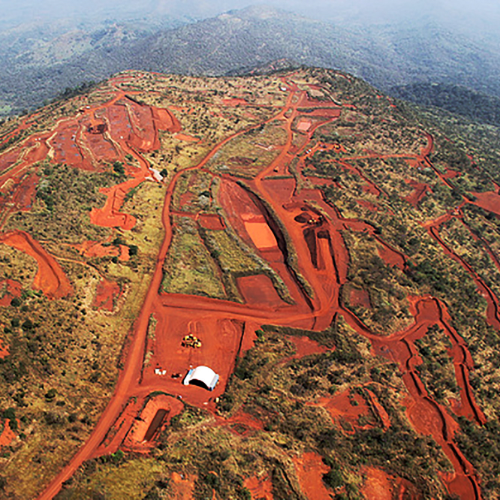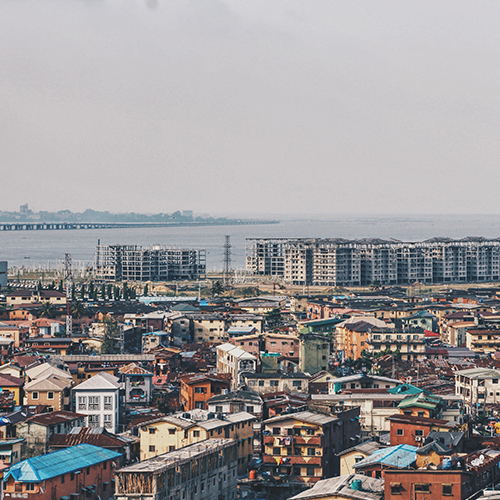
 16 Nov 2020
16 Nov 2020
Phanar Legal, cabinet d’avocats basé à Londres, et Sylla &Partners, cabinet d’avocats guinéende premier plan, sont heureux d’annoncer qu’ils ont conjointement et dans le cadre d’une équipe intégrée, conseillé le gouvernement guinéen dans le cadre de l’opération révolutionnaire de 14 milliards USD de Simandou Nord impliquant le projet intégré mine, chemin de fer et port en eaux profondes.
Ce projet est le plus grand projet minier et d’infrastructure à travers le continent africain, qui permettra de libérer le potentiel de l’un des plus grands gisements de minerai de fer de haute teneur du monde. Le projet comprend la construction d’un chemin de fer trans-guinéen de plus de 650 km ainsi qu’un port côtier d’une capacité de production annuelle estimée à 100 MTPA. Le Trans-guinéen constituera pour la première fois une liaison de transport directe à travers le pays, permettant l’acheminement des produits miniers et des cargaisons d’autres opérateurs et producteurs. Le projet servirade catalyseur pour le développement économique tout au long du corridor ferroviaire, en particulier dans le secteur agricole, générant d’importantes opportunités d’emploi et de richesse pour le pays et sa population.
L’assistance de l’équipe intégrée de Phanar et Sylla &Partnersà l’État de Guinée a d’abord consisté en la préparation des documents d’appel d’offres et la mise en œuvre dudit appel d’offres au cours de l’année dernière(Phase I). Elle a ensuite consisté en l’assistance dans la préparation, la négociation et la conclusion d’une convention minière signée le 8 juin 2020 et des conventions ferroviaire et portuaire signées le 12 novembre 2020 (Phase II). Ces trois conventions, ensemble, forment le cadre juridique applicable au projet Simandou Nord.
«Ce projet est un projet transformateur et c’est un privilège d’y avoir contribué. Nous avons été impliqués depuis la conception et l’organisation de l’appel d’offrescompétitif jusqu’à la signature des documents du projet comprenant une convention minière, une convention ferroviaire et une convention portuaire. C’est un hommage à la fois à la République de Guinée et à SMB-Winning d’avoir pu conclure des négociations aussi complexes pendant la pandémie de Covid 19. Nous rendons également hommage à notre cabinet partenaire guinéen Sylla &Partners sans qui cettecollaboration n’aurait pas pu être réalisée. Cela augure bien d’une relation extrêmement constructive et mutuellement avantageuse entre Phanar et Sylla &Partners.
« En tant que Guinéen, tout ce que je peux dire, c’est que je suis très fier que Sylla &Partners ait soutenu le gouvernement dans le cadre de ce projet. La vision, l’énergie et l’inspiration du Président et duMinistre des Mines, ainsi que le dévouement et le professionnalisme des cadres du Ministère des Mines ont abouti à ce projet transformateur. Le consortium SMB-Winning doit également être applaudi pour l’approche positive et constructive qu’ils ont adoptée tout au long du processus. Ce projetqui a été de tout temps le rêvede tout un peuplechangera littéralement la vie de plusieurs générations et Sylla &Partnersest honorée d’avoir participé à sa réalisation. Nous nous réjouissons de la coopération constructive avec le cabinet Phanar qui prépare la voie à une coopération plus proche entre nos cabinets.”
Note aux éditeurs
Phanar (www.phanarlegal.com) est un cabinet d’avocats spécialisé dans les affaires de ressources naturelles en Afrique. Phanar répond aux besoins des clients qui exigent la qualité de service juridique attendue des grands cabinets d’avocats internationaux, mais avec une approche hautement individualisée. Le cabinetoffre une connaissance approfondie du secteur minier et la capacité de gérer des négociations contractuelles complexes multi-juridictionnelles.
Sylla &Partners (www.syllapartners.com) est un cabinet d’avocats d’affaires international guinéen de premier plan créé en 2013. Il est réputé pour la haute qualité de ses services et son expertise dans la gestion de problèmes complexes et juridiques en apportant des solutions juridiques innovantes. Le cabinet jouit d’une réputation et d’une expertise inégalées dans le domaine minier et est intervenu dans la plupart des transactions minières clés du pays.
Pour plus d’informations contactez Philip Rogers au +44 20 3915 5618 ou Mohamed Sylla au +224 622 28 10 16
 12 Oct 2020
12 Oct 2020
OHADA (short for “Organisation pour Harmonisation en Afrique du Droit des Affaires“), being the international organisation responsible for harmonising business law in Africa, was set up by international treaty in 1993, comprising 17 African States. Whilst any African country can accede to the treaty, as the laws are modelled on civil law concepts OHADA has in practice been of interest to civil law jurisdictions, the vast majority of which are francophone.
OHADA laws (set out in a series of codes) bear remarkable similarities in legal terms to EU Regulations in that they are both supranational (i.e. are not promulgated at national level) and are directly applicable in each of the OHADA member states (i.e. they apply directly as a matter of domestic law without any national implementing legislation). In other words,exactly the same set of laws (Codes)apply in identical terms across each of the members states.
In a European Union context much ink has been spilt on describing the unifying role of the European Court of Justice in creating common standards and promoting the four fundamental freedoms in the EU (being freedom of movement of goods, persons, services and capital). OHADA has instituted a similar regime with the Common Court of Justice and Arbitration (“CCJA”) which sits in Abidjan in the Ivory Coast. As with the ECJ with regard to EU law, the CCJA across the OHADA is the highest court as to matters of OHADA law. This is provided for in a number of ways:
OHADA has been successful in introducing an ever increasing array of Codes covering most aspects of business law. Specifically OHADA has introduced the following Codes (called “Uniform Acts”(Actes Uniformes)):
In a commercial context the Uniform Company Code, Code on taking security and Insolvency Code are of greatest significance. This means for instance that the forms of company, articles of association and registration of charges are identical across the whole of the OHADA region. A corollary of this is that investors may use the same lawyer to advise them on these matters for transactions across the OHADA region. The CCJA is also gaining traction as an arbitral forum with the Arbitration Law being recognisedby international practitioners as well-constructed set of rules by reference to international arbitration rules such as the ICC Rules. Whilst London and Paris are likely to remain popular seats of arbitration due to the excellent reputation of their national courts, there is no doubt that CCJA will become increasingly popular, particularly amongst African sovereign states and corporations as investors gain confidence in the reliability and professionalism of the CCJA.
Africa is fast becoming a huge investment target as international investors look for markets with high growth potential. One of the key purposes of OHADA and the CCJA is to provide a secure and reliable legal framework for foreign direct investment. The comfort provided to foreign investors of being able to appeal to an independent supranational court free from interference of the national jurisdictions is difficult to underestimate. Similarly, the predictability and standardisation of legal processes and documentation across OHADA countries brings significant benefits and cost-savings for companies operating across multiple OHADA jurisdiction.
For more details on OHADA please refer to www.ohada.com.
 12 Oct 2020
12 Oct 2020
For many lawyers due diligence means undertaking a desktop study of documents, often by junior lawyers, collated on the basis of responses to a due diligence questionnaire. The junior lawyers may be asked to fill in templates designed to get them to focus on typical legal issues such as change of control clauses. If the lawyers follow best practice, they will go further and tailor the questionnaire to focus on key areas of risk as well as value drivers.
However as with any process, the reliability ofresults will depend on the methodology used, and any robust due diligence process should not just be based on a desktop study focussing on documents. There is a danger of not seeing the wood for the trees, with lawyers frequently using up valuable billable hours focussing on relatively trivial matterswhilst not always spotting the proverbial elephant in the room.
In natural resources deals, the large investments involved as well as the long-term nature of the investments associated with host country risk make due diligence crucially importance. It is axiomatic that title issues are of paramount importance in natural resource deals; indeed, if an investor does not have good title to resource it has nothing. International lawyers are well used to working with counsel in the relevant jurisdiction to obtain a “title opinion” to give comfort to investors and their funders. Again lawyers following best practice will actively manage the process of obtaining the title opinion by ensuring that the relevant country counsel makes all relevant searches and enquiries. But is that enough? A recent high court decision in London involving a Nigerian oil concession would suggest otherwise.
The facts go back to January 2010 when the Republic of Nigeria entered into a gas supply and processing agreement (the “Agreement”) with Process & Industrial Developments Limited (“P&ID”), a sole purpose BVI registered Shell Company that had no track record in the oil and gas sector. Under the Agreement, Nigeria was to supply P&ID with natural gas for 20 years at a facility to be built by P&ID.The Agreement was not implemented and an arbitral tribunal found in favour of P&ID by final award of $10 billion in 2017 which P&ID successfully applied to enforce in August 2019. This was one of the largest ever awards against a sovereign entityamounting to a quarter of the country’s foreign reserves or a fifth of its annual exports which was based on the loss of two decades of presumed profits and interest.
Earlier this month, the High Court granted Nigeria a time extension to challenge a US$10 billion arbitral award issued against it in January 2017 one of the largest awards granted against a sovereign state, notwithstanding that the time limit of 28 days for extensions under the Arbitration had passed. The extension was admittedon the basis that the Agreement and the award were tainted by fraud and after Nigeria admitted that due diligence relating to P&ID had not been adequately undertaken and that the official involved lacked authority to approve the deal and did no due diligence on the company which it claims was unqualified and lacked petroleum industry experience
Whilst many legal commentators focus on the high court’s approach in considering issues of fairness as well as other factors, it remains an extraordinary decision which shows that where there is strong prima facie evidence of fraud, the courts, or English courts at least, will bend over backwards to be seen to upholding justice.It also demonstrates the legal threat that arbitration can pose in major investment disputes.
In a due diligence context, particularly when investigating title issues, it shows the importance of lifting the bonnet and looking behind the documents. We do not know if P&ID obtained a formal title opinion before making its investment but it is likely that it did. As the maxim goes “Fraus Omnia Corrumpit”.